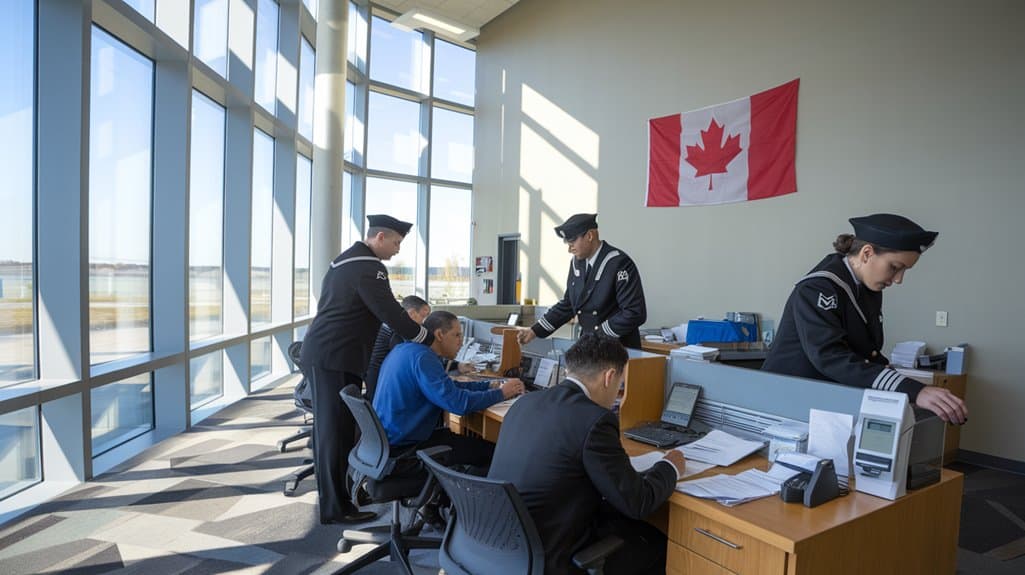
If you’re facing immigration detention in Canada, you have specific rights, including a detention review within 48 hours and access to legal representation. The CBSA can detain foreign nationals and permanent residents for safety or compliance issues, but you can challenge this through hearings. You can gather evidence, work with a bondsperson, or explore alternatives like electronic monitoring. Understanding the process and your options will strengthen your position for release.
Understanding CBSA Detention Powers
The Canada Border Services Agency (CBSA) holds significant authority to detain foreign nationals and permanent residents under specific circumstances that affect public safety and immigration compliance.
CBSA officers can detain non-citizens and permanent residents when public safety or immigration compliance issues arise.
You’ll need to understand that the CBSA can detain individuals if they’re considered a flight risk, pose a danger to the public, haven’t established their identity, or face potential inadmissibility for security or criminal reasons.
If you’re detained, you’ll receive a detention review hearing within 48 hours of your arrest. During this hearing, the CBSA will present evidence supporting their decision to detain you.
You have the right to respond to these allegations and present your own evidence. If you’re not released after the initial review, you’ll get another hearing in 7 days, followed by reviews every 30 days until a resolution is reached.
Your Rights During Immigration Detention
While detained by immigration authorities in Canada, you’re entitled to specific legal rights that protect your interests throughout the detention process.
You have the right to a detention review hearing within 48 hours of being detained, and you can hire legal counsel or represent yourself. If you can’t afford a lawyer, you may qualify for free legal aid.
You’re also entitled to receive written notice of your hearing, review the evidence against you, and present your own evidence. You can call witnesses, challenge the CBSA’s arguments, and request an interpreter if needed.
During detention, you have the right to contact family members, your embassy, or consulate. If you’re detained longer than seven days, you’ll get another review, followed by reviews every 30 days.
The Detention Review Timeline
Once you’re detained by Canadian immigration authorities, a strict timeline of review hearings begins to guarantee your case receives proper oversight.
Your first detention review must occur within 48 hours of your detainment, where an Immigration Division member will assess your case.
Within two days of being detained, you’ll face your first review where immigration officials evaluate your situation.
If you remain in detention after the first review, you’ll have another hearing within 7 days.
Should that review also result in continued detention, you’ll receive subsequent reviews every 30 days.
At each hearing, you can present new evidence or changed circumstances that support your release.
You’re entitled to representation at these reviews, and you may qualify for legal aid.
The CBSA must justify your continued detention at each review, while you’ll have the opportunity to propose alternatives to detention.
Preparing for Your Detention Review Hearing
Proper preparation for your detention review hearing can greatly improve your chances of release.
You’ll need to gather evidence that addresses the specific reasons for your detention, whether it’s identity concerns, flight risk, or public safety issues. Consider collecting supporting documents like letters of reference, proof of identity, or a detailed release plan.
If you’re eligible for legal aid, apply immediately. You can also hire private counsel or represent yourself.
Make sure you’ve prepared a clear explanation for any past non-compliance with immigration requirements and have a solid plan for following conditions if released. This might include arranging for a bondsperson, securing accommodation, or establishing regular reporting schedules with CBSA.
Document everything and organize your materials before the hearing.
Working With a Bondsperson
A bondsperson plays three critical roles in your detention release process: financial guarantor, accountability partner, and character reference.
When selecting a bondsperson, you’ll need someone who’s financially stable, trustworthy, and willing to supervise your compliance with release conditions.
Your bondsperson should understand their responsibilities, which include posting a cash or performance bond and ensuring you attend all required hearings.
They’ll need to demonstrate to the Immigration Division that they can effectively monitor your activities and report any violations of your conditions.
To work effectively with your bondsperson, maintain open communication and provide them with accurate information about your case.
You’ll also need to respect their commitment by following their guidance and meeting all obligations under your release conditions.
Release Conditions and Compliance
When you’re released from immigration detention, strict conditions will govern your activities and movements until your case is resolved.
Release from immigration detention comes with rigid restrictions that monitor and control your daily life throughout legal proceedings.
You’ll need to comply with requirements like regular reporting to CBSA, maintaining a specific residence, and possibly adhering to curfews or travel restrictions.
You must follow all conditions exactly as specified, as any violation could result in re-detention.
Keep detailed records of your compliance, including dates of check-ins and any communication with authorities.
If you need to modify your conditions due to work, family, or other circumstances, you can submit a formal request to the Immigration Division using their conditions variation form.
Remember that your bondsperson is also counting on your compliance, as they may face financial consequences if you breach your conditions.
Legal Support Options During Detention
Legal representation plays a critical role during immigration detention, and you’ll want to understand all available support options.
You can choose to represent yourself, hire a private lawyer, or seek free legal aid if you’re eligible. Many provinces offer legal aid services specifically for immigration detention cases.
If you can’t afford private counsel, you may request help from community organizations that provide pro bono legal services. Your family members or friends can also act as unpaid representatives during your detention review hearings.
Additionally, you’ll find that some immigration consultants specialize in detention cases and can offer their expertise at lower rates than lawyers.
Remember to verify any representative’s credentials through proper channels to ascertain they’re authorized to represent you in immigration matters.
Alternatives to Immigration Detention
Several alternatives to immigration detention exist through Canada’s Border Services Agency (CBSA) if you’re facing potential detention but don’t pose a significant risk to public safety.
You might be eligible for release with conditions, which can include regular reporting to CBSA offices, maintaining a specific residence, or following a curfew.
Cash bonds or performance guarantees from a bondsperson can also secure your release. The bondsperson must demonstrate their ability to influence your compliance with conditions.
Electronic monitoring through devices like ankle bracelets offers another alternative, allowing CBSA to track your location.
Community supervision programs, where trusted organizations help monitor and support you, may also be available.
These alternatives help guarantee you’ll appear for immigration proceedings while maintaining your freedom.
How Canadian Currents Immigration Can Help
Canadian Currents Immigration provides extensive support for individuals facing detention challenges through our team of experienced immigration lawyers, consultants, and paralegals.
We’ll work with you to understand your specific situation and develop a tailored strategy for your detention review hearing. Our professionals can represent you before the Immigration Division, prepare compelling evidence, and craft strong arguments for your release.
You’ll benefit from our decades of combined experience as we guide you through every step of the detention review process.
We can help establish alternatives to detention, arrange bondspersons, and create detailed release plans. If you’re currently detained or facing potential detention, we’ll guarantee your rights are protected while working efficiently to achieve the best possible outcome for your case.
Frequently Asked Questions
Can I Receive Packages or Personal Items While in Immigration Detention?
You can receive personal items and packages in immigration detention, but they’ll be inspected first. You’ll need to follow specific facility rules about permitted items and delivery times.
What Happens to My Belongings if I Am Detained Unexpectedly?
Your belongings will be inventoried and stored by CBSA while you’re detained. You’ll receive a receipt, and items will be returned when you’re released or transferred to another facility.
Are Visitors Allowed During Detention, and What Are the Visiting Hours?
Yes, you can receive visitors during detention at Immigration Holding Centres. Hours vary by facility, but visits typically occur during daytime hours. You’ll need to provide visitor names for security clearance.
Can I Continue Working or Studying if Released With Conditions?
You can work or study while released with conditions, but you must strictly follow all requirements set by CBSA. Your release conditions will specify whether you need additional permits or restrictions.
How Do I Access Medical Care or Prescription Medications While Detained?
You’ll receive medical care and medications through the detention facility’s healthcare services. Tell staff about your medical needs and prescriptions immediately upon arrival. They’ll arrange the necessary treatment and medications.
Conclusion
You’re not alone in traversing Canada’s immigration detention system. With a proper understanding of your rights, timely legal support, and preparation for detention reviews, you’ll be better positioned to present your case effectively. Remember that you’re entitled to regular hearings, legal representation, and alternatives to detention. Stay informed about your options, maintain detailed documentation, and work with qualified professionals to strengthen your position throughout the process.

We serve ALL of Canada. Currently have offices Western Canada — Vancouver, Calgary, Edmonton, Kamloops and Red Deer. We also have the infrastructure to work with any of our clients virtually — even from the furthest regions of the Yukon to Newfoundland.
Call (778) 331-1164 [toll free 1 (844) 715-0940] to get routed to the best office for you or contact us online to schedule an appointment.
We also have a dedicated intake form to help you get the ball rolling. Our intake team will review your specific case and advise you on the next steps to take as well as what to expect moving forward.
Our offices are generally open 8:30 a.m.—4:30 p.m., Mon—Fri.

Shantale D’Aoust
IMMIGRATION LAWYER
Shantale has vast advocacy experience, and she strives to help her clients navigate through their legal issues by assessing risks to provide practical options and tailored solutions to their unique legal matter. Her core areas of practice include permanent residence and temporary residence applications and appeals, and matters involving the interplay between immigration laws and family law issues.



